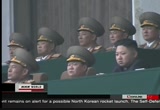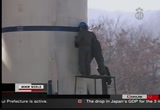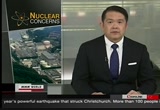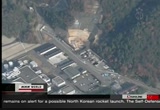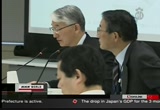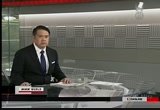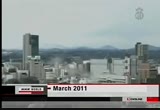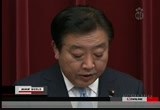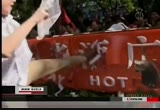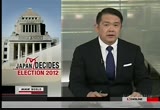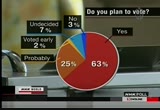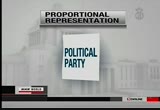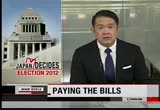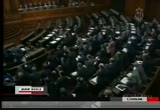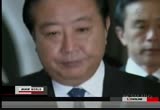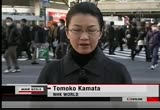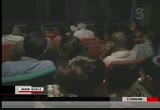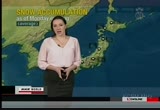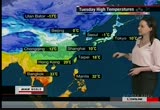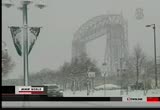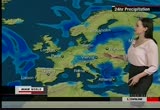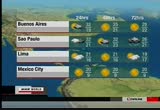tv Newsline 30min KCSMMHZ December 10, 2012 6:00am-6:30am PST
6:00 am
change in plans. north korea's space agency says its rocket launch may not happen until the end of this month. welcome to nhk world "newsline." north korea has announced it will extend the period for launching what it calls a satellite carrying rocket by one week. the new launch period will end on december 29th. officials in many countries believe the north's real goal is to test long-range missile technology. the country's committee of space technology said on monday a technical problem was found in
6:01 am
the first stage of the three-stage rocket. north korea said earlier this month it would launch the rocket between december 10th and 22nd from the tongchang-ri launch site in the country's northwest. the south korean official told nhk satellite photos taken on monday show what appear to be people and vehicles moving around the launch site. the official says a missile on the launch pad remained covered. the activity on the ground suggests a possible technical problem is being fixed. north korea's last launch in april failed. its leadership promoted the event by saying the nation was honoring the instructions of late leader kim jong-il. details of the planned launch have not been reported inside the country. for more on this issue we turn to our security analyst, bonji ohara, a former navy captain with japan's maritime self-defense force. >> it's difficult to define specific problem in the launch. but it might be the simple mechanical trouble not structural problem because they
6:02 am
said they would extend the period only seven days. they failed to launch the rocket last april and they are trying to launch now. it's the eighth month. but this eighth month is crucial to fix the problems. so i think they expect some level of risk of failure means launch in this period is important for north korean leaders, even though they have some risk of failure. so i think they will try, keep trying to launch the rocket, neighboring country arguing the missile launch test in this period. people in japan are weighing their options and preparing to make a decision that will affect
6:03 am
their future. they cast ballots next sunday in a general election. when japan decides voters will be picking lawmakers for the lower house of the diet. the winning party or parties will form the country's next government. voters have a lot to think about. a search for active earthquake faults may lead to the scrapping of one of them. the implications run deep for japan's nuclear policy. we have the story. >> reporter: 17 commercial nuclear plants in one major test reactor have been built in japan. the nuclear regulation authority
6:04 am
was formed after last year's disaster to monitor their safety. experts at the authority are trying to determine if any of the reactors lie above active fault lines. the plan in central japan is known to have an active fault running close by. the fault is called urasoko. another fault called d-1 intersecretaries with the urasoko fault. a team of experts dug up the ground at the plant so they could inspect the fault directly. the government panel examined the results of the so-called trench survey. panel members said on monday that the d-1 fault is probably active. they said that layers of earth near the fault have become deformed. that deformation is believed to
6:05 am
cause d-1 to become active when the default moves. national guidelines ban the building of major facilities directly above active faults. the chairman of the nra had this to say -- >> translator: under the current circumstances, it's my view that we cannot grant a permit to restart the reactor. >> reporter: the authority will hold an off shore meeting to make a final determination on fate of the nuclear facility. if they conclude that the d-1 fault is active, the plant's operator will not be allowed to restart the number two reactor. he may have to be decommissioned. he'll be the second japanese nuclear plant slated for decommissioning. the fun sheema daiichi plant was closed after being crippled by last year's earthquake and tsunami. many other nuclear plants in
6:06 am
japan could have active faults running directly underneath them. they include the oi plant which the government allowed to go back online in july. these finding are certain to raise questions about the government's ability to make decisions concerning the regulation of nuclear energy. yoichiro tatiwa, nhk world. people in japan are weighing their options in preparing to make a decision that will effect their future. they cast ballots next sunday in a general election. when japan decides voters will be picking lawmakers for the louer house lou lower house of the diet. the parties will form the next government. voters have a lot to think about. we'll be examining the key issues all this week here on
6:07 am
"newsline." prime minister noda is facing the biggest fight of his political life, nhk's latest opinion poll suggests he could be in trouble. this election, like any, has a lot of moving parts which can confuse those who are unfamiliar with the system. >> reporter: we should work together to tackle japan's challenges. >> translator: i'm determined to do everything possible to move politics forward using a down to earth approach. >> reporter: and there were many challenges. reconstruction following the 2011 disaster, containment of the fukushima nuclear accident. and fiscal reform and economic growth. they faced them one by one with varying degrees of safe. the prime minister called on
6:08 am
workers to sped up ed up reconstruction. he took the lead on fukushima crisis. 'announced that crews stabilized the damaged reactors. he replaced mountains of soil and debris lightly contaminated by radiation. and he made a vow to residents who had evacuated areas around the plant. >> translator: i promise network so lots of your friends can return home as soon as possible. >> reporter: last june noda weighed concerns about safety, the economy and energy supply when he decided to restart two nuclear reactors the first to go back online since the fukushima accident. some members of his democratic party left the party in protest. noda faced challenges on the foreign policy front. he focused on repairing the damage to japan-u.s. ties caused by a disagreement over the relocation of an american base
6:09 am
in okinawa. >> translator: security environment is getting come olympic indicated so i believe our alliance is really important. >> reporter: noda worked to improve relations with u.s. continued as relation with china deteriorated. his government nationalized the senkaku islands in the east china sea. japan controls the territory. china and taiwan claim it. chinese ships enter japanese waters near the islands and chinese alleged anti-japan demonstrations. noda's key domestic policy issue was fiscal reform. he staked his career on hiking the consumption tax and reforming social security to chip away at japan's rising debt. the opposition liberal democrats and their allies helped him pass a package of bills after he promised to call a general
6:10 am
election soon. but then noda added conditions. he wanted to enact legislation allowing the government to issue bonds defined as the current fiscal year's budget and he wanted to reform the electoral system. >> translator: if you agree to this condition i'm ready to dissolve the lower house on november 16th. please give your word to the people. >> reporter: that's what opposition leaders did. setting the stage for the election. >> prime minister noda is facing the biggest fight of his political life. nhk's latest opinion poll suggests kobe in trouble. the leader of the opposition party is attracting more support. we surveyed about 2,600 voters over the weekend. 19% say noda is better suited for the top job. 28% believe abe will make a before prime minister.
6:11 am
47% don't believe neither. 25% preferred abe as prime minister and 25% preferred noda. the approval rating for noda's cabinet is sitting at 20%. this is the lowest it's been since he took office a little more than a year ago. our poll also asked respondents if they plan to vote. 63% say they will cast ballots on election day. that's seven points lower than a poll nhk took at this same point leading up to the lower house election three years ago. this election like any has a lot of moving parts which can coe those who are unfamiliar with the system. so here's how japanese voters make their choices. the diet is made up of the upper house or house of counselors and lower house or house of representatives. the lower house has 480 members and more powerful.
6:12 am
in a general election citizens 20 years and older decide on who will sit in it. they can make this choice in two ways. voters mark one ballot to choose the person to represent their electoral district, there are 300 such districts across japan. one member from each earns a place in the lower house through the single seat constituency system. the other 180 members are assigned by proportional representation. for those seats voters pick from the list of political parties participating in the election. the 180 seats are divided up among the parties according to the portion of the vote they get. voters can cast ballots in both systems. after the election new and returning diet members vote to choose the next prime minister. the leader of the party with the
6:13 am
majority in the chamber or the majority in a governing coalition usually gets the job. these 12 groups met the criteria to be called a political party in this election. they included long established parties and several new ones that were just founded. several other groups failed to meet the standards but are still fielding candidates. politicians will be campaigning on a number of issues. one of them is the consumption tax hike we mentioned. prime minister noda put his job on the line when he decided to double the rate 120%. -- to 10%. noda says taxes are needed to pay for social security. >> reporter: paying taxes is one of life's certainties. like death japanese know they can't avoid it. but the fact they have to pay a bit more has them divided. >> translator: i'm living on my pension.
6:14 am
i don't want taxes to go up. i think there were better ways for the government to handle it. >> translator: i'm concerned about the future so i think we have to pay what we have to pay. i think the tax hike is necessary. >> reporter: politicians have debated the necessity of a consumption tax for years. a liberal democratic party government introduced the tax in 1989 of 3%. low compared to other developed countries. still then as now voters cried out. the liberal democratic government raised the sales tax to 5% in 1997. and it went down to defeat in the upper house election the following year. no surprise that successive prime ministers avoid any talk of increasing the tax.
6:15 am
but they couldn't avoid the increasing cost of social security. japan spent more than $1.2 trillion on it in fiscal 2010, up 3.6%. but revenue from social insurance premiums stayed the same and fewer young people are paying into the system. this past august noda convinced the main opposition liberal democratic party and its partner to back another tax hike. >> translator: i will stake my life and political career on passing this bill. >> reporter: lawmakers did approving bills that would double the consumption tax by 2015. still, many were opposed. opposition members sure but also many within the ruling party. more than 50 of them bolted, saying voters would not agree to the hike. in an nhk poll this month suggested that may be true.
6:16 am
it suggested 37% of them are against the tax hike. 29% support it. some japanese argue they can't afford any more taxes. more than 1.5 million of them are on welfare, the highest level ever. but noda says the government has to pay its bills and the money has to come from somewhere. our coverage leading up to sunday's general election continues all this week. four use tuesday is on energy
6:17 am
policy and how the future of nuclear power is dividing the nation. republican renaissance electronics is getting $2.4 billion in financial assistance. they announced they'll receive capital injections or loans totally $2.3 billion from a state-backed fun that innovation network of japan. eight japanese manufacturers including panasonic will provide over $140 million. they will hold a majority stake in renaissance after the
6:18 am
investment. they incurred significant losses because of the excess production capacity. it's planning to sell or close half of its 18 plants in the country to slim down. the company has cut 7,000 jobs and does plan to eliminate 5,000 more. now a u.s. investment fund had also proposed capital injection for the company. but the japanese government and manufacturers preferred a domestic rescue-package to help keep the company's microchip technology within the country. leading japanese retailer aeon has started cambodia's biggest shopping mall. the prime minister and 4,000 people attend ad groundbreaking ceremony on monday. >> reporter: aeon's move proves cambodia is politically stable with the right conditions in place to attract foreign investment. >> the four story shopping
6:19 am
complex is scheduled for completion in early 2014. sri lafrpga's art scene suffered. now peace returned, passion nall individuals want to revive those traditions. they include one young woman trying something new to bring pub etry back to life. >> reporter: a puppet spins, it's dress flutters. sri lankan puppetry dates back 30 years. this is a traditional puppet of sri lanka, and you have to train at least five years to learn to move it freely. >> but the tradition is fading, a sad legacy of the country's long civil war. during the conflict. large outdoor events weren't
6:20 am
possible because of the risk of bomb attacks. >> up and down and up -- >> reporter: this woman is a stage director and puppeteer. while studying overseas, she became enchanted by puppets and their rich expressions. she found herself being lured into their world. >> they allow people to talk honestly to each other and when you talk honestly, you start listening more some of that is why i feel puppetry is a huge medium of communication in
6:21 am
modern-day sri lanka. >> she had the honor of directing a performance with a puppet master. when the master performs, behind the curtain, he moves in step with his puppets. is he showing his passionate work to the audience would help them connect with the performance. the show opened early in november at a show in colombo. the puppet dances to the music.
6:22 am
6:23 am
i had never seen that before. >> i was having nightmares about it, but it all happened beautifully, just like i imagined. i want the opportunity to have it as a medium of communication. >> reporter: people's lives are returning to normal in sri lanka, after decades of civil war. the director believes it's just as important to preserve traditions as to keep the country united. her effort to communicate that message through puppetry has only just begun. nhk world, colombo. it's snowing in many parts of japan. rachel ferguson here with details on that. rachel. >> yes, it is snowing. it will continue to snow into tuesday. let's show you some of the accumulations so far. you'll notice that most of the snow is focused along the sea of japan side of the country. sea-affect snow. have you heard of lake-effect snow. similar thing. basically same idea. winds come across from the northwest. pick up the moisture off the sea of japan and dump it along the western edge of the country. more than a meter has accumulated in some places. in the blue here in brackets,
6:24 am
you can see the average for december. and we're already well exceeding that in many places across the country. into the next 24 hours, still likely to see an additional 60 to 70 centimeters in the blue. in the pink along the western edge, you could see up to 80 centimeters of additional snowfall. skiers and snowboarder will be happy, but up toward the north, we're seeing really strong winds. buffeting all the snowfall around and will make for some potentially dangerous travel. so be very careful if you have to go out in that. now, temperaturewise, we're seeing 10 degrees in tokyo, not really being affected too much by the cold, certainly not by the snow around freezing point in seoul and bejing, minus 17 in ul lambator. 20 in hong kong. to the americas, you are just getting a smashing of snow over the northern rockies, not too much going on through central and northern portions of the continent. a frontal system moves further
6:25 am
toward the atlantic. let's show you what happened when the front moved through. video of the wisconsin. as it moved across the dakotas and great lakes region, plows out in full force in wisconsin. traffic obviously crawling there due to slick roads, but skiers and snowboarders took to the slopes for the first time this year after the winter storm dumped plenty of fresh powder. not everyone was enjoying the snow, however, and there were more than 20 car crashes reported across minnesota. as a result of the early season storm. most of them stuck in ditches or
6:26 am
in snow banks. now, after that cold front passes, temperatures are really going to be falling across much of the east. let's show you some of the figures. in chicago, you are down to 2 degrees for your high. 4 degrees in oklahoma city. 11 in houston. tuesday, you will see 1 degree for the low in houston. right down to the south, seeing temperatures really fall. and along that cold front, i should say as well. some very heavy rain and thunderstorms. which could be on the severe side, likely too. we'll head into europe, show you what's been going on to the southeast. a low moving across turkey, brought more than 250 millimeters of rain to parts of the southwest. now, the storm is on the move, but another one just behind it, moving once again across the balkans, another 30 to 60 cent meters of snow here and it will head toward turkey after that.
6:27 am
across the west, conditions starting to settle down here, even for central locations, really good news. high pressure expanding here. very clear for you on tuesday into wednesday. temperatures are looking pretty cold, though. london and paris, both 4 degrees around the freezing point in berlin, as well as vienna, and minus 4 in warsaw and moscow. i leave you now with your extended forecast. we'll be back with more news in 30 minutes. i'm gene otani in tokyo. thank you for joining us. have a great day, wherever you
177 Views
IN COLLECTIONS
KCSMMHZ Television Archive
Television Archive  Television Archive News Search Service
Television Archive News Search Service 
Uploaded by TV Archive on

 Live Music Archive
Live Music Archive Librivox Free Audio
Librivox Free Audio Metropolitan Museum
Metropolitan Museum Cleveland Museum of Art
Cleveland Museum of Art Internet Arcade
Internet Arcade Console Living Room
Console Living Room Books to Borrow
Books to Borrow Open Library
Open Library TV News
TV News Understanding 9/11
Understanding 9/11
